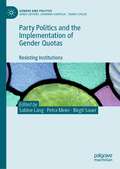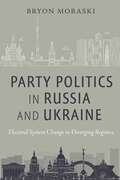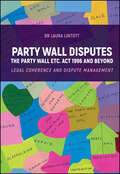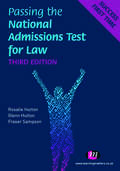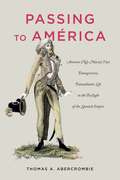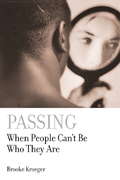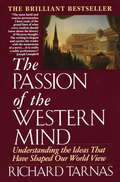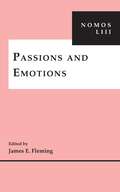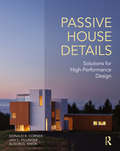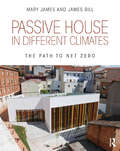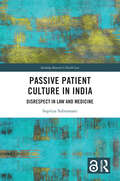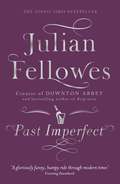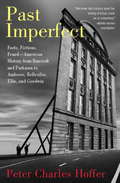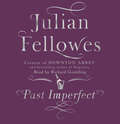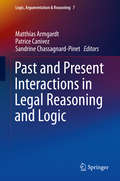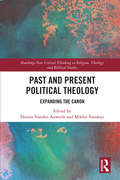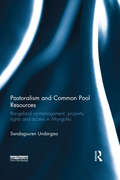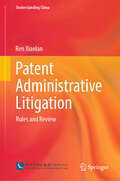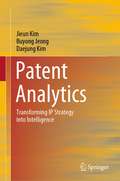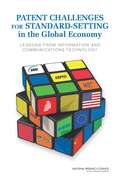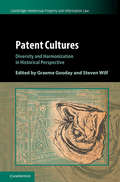- Table View
- List View
Party Politics and the Implementation of Gender Quotas: Resisting Institutions (Gender and Politics)
by Sabine Lang Birgit Sauer Petra MeierThis edited collection explores how party politics impacts the implementation of gender quotas in political representation across Europe. Contributors identify actors, institutions, and cultural legacies shape how quotas are put into practice. The volume’s subtitle, Resisting Institutions, points to the myriad ways in which parties and other institutions in Europe over time have resisted the inclusion of women into politics. As voluntary party quotas and legislative quotas gained prominence, so did strategies to undermine them. At the same time, Resisting Institutions also indicates that gender equality actors have developed ways to counter such blockages and advance the cause of parity in their legislatures. 17 country cases explore the current state of quota implementation and the effects of confronting androcentric institutions.
Party Politics in Russia and Ukraine: Electoral System Change in Diverging Regimes
by Bryon MoraskiExamines how political parties navigate major election reforms by comparing electoral system changes in Russia and Ukraine at the same time, under different regimes In Party Politics in Russia and Ukraine, Bryon Moraski provides a window into the political landscapes of Russia and Ukraine, two countries that have clashed with each other—and struggled with their own popular revolts—in recent years. Drawing on election outcomes, party nominations, parliamentary voting, and other data, Moraski highlights how ruling parties, incumbent legislators, and others have adapted to major electoral system changes in both countries.Moraski sheds light on how authoritarian regimes—and the ruling parties that support them—have used changing conditions in their countries to consolidate their power, with varying success. Exploring the swiftly changing political arena of Eastern Europe, Party Politics in Russia and Ukraine offers timely insight into the impact of elections in the twenty-first century.
Party Wall Disputes: The Party Wall etc. Act 1996 and Beyond - Legal Coherence, Disputes and Management
by Laura LintottAn accessible roadmap to the complexities of party wall disputes Party Wall Disputes: The Party Wall etc. Act 1996 and Beyond - Legal Coherence and Dispute Management meets the need for a roadmap to the main areas of law and fact relevant to party wall disputes: Statutes, including a detailed analysis of the Party Wall etc. Act 1996 and other relevant legislation,Property rights, such as rights of way, rights of support, drainage rights and rights linked to easements,Torts, such as nuisance related to noise and vibration and breaches of rights to light, andFactual matters, such as structural issues. In addition, this book maps out the available dispute management options under the Party Wall etc. Act 1996, in court as well as alternative dispute resolution methods (arbitration, mediation, medi-arb, expert determination and early neutral evaluation). The result is an invaluable resource for lawyers, party wall surveyors, construction professionals, academics and property owners who encounter or are interested in party wall disputes. “I can say with confidence that Dr Lintott has done the professions both of the law and of surveying in particular, as well as property owners, a great service in providing something of a stocktake…, where the tectonic plates of title, use of land, statute and common law, easements, planning and construction codes, rights, liabilities and obligations all meet. … She is mindful of the reality that party wall practice is ultimately driven by mutual proprietorial and essentially practical considerations …” —THE EARL OF LYTTON
Pasando paginas: La Historia De Mi Vida
by Sonia SotomayorAl ser la primera mujer latina en ser jueza del Tribunal Supremo de Estados Unidos, Sonia Sotomayor es una inspiración para los jóvenes de todas las partes del mundo en la lucha por lograr sus sueños. Pero ¿qué la inspiró a ella? Para la joven Sonia, la respuesta es: ¡los libros! Eran su espejo, sus mapas, sus amigos y sus maestros. Los libros la ayudaron a conectar con su familia en Nueva York y en Puerto Rico, a aceptar y entender el diagnóstico de su diabetes, a hacer frente a la muerte de su padre, a descubrir los secretos del mundo y a soñar con un futuro en el que todo es posible. En Pasando páginas, Sonia Sotomayor comparte su amor por los libros con una nueva generación de lectores, estimulándolos a leer, a maravillarse y a realizar sus sueños. Acompañada del arte vibrante de Lulu Delacre, la historia de la vida de Sonia Sotomayor muestra a los lectores que el mundo está lleno de promesas y posibilidades; lo único que necesitan es pasar la página.
Passing the National Admissions Test for Law (Student Guides to University Entrance Series)
by Rosalie Hutton Glenn Hutton Fraser SampsonThe LNAT entrance exam is now a requirement at many leading UK universities. This fully revised and up to date guide provides an in-depth understanding of both Parts A and B of the test. The rationale and use of critical reasoning tests is explained, including the style and format of the multiple-choice questions used. A practice test is provided which follows the LNAT approach, together with explanations of both the correct and incorrect answers. This edition contains new questions and answers and a new section on applying to university to read law.
Passing to América: Antonio (Née María) Yta’s Transgressive, Transatlantic Life in the Twilight of the Spanish Empire
by Thomas A. AbercrombieIn 1803 in the colonial South American city of La Plata, Doña Martina Vilvado y Balverde presented herself to church and crown officials to denounce her husband of more than four years, Don Antonio Yta, as a “woman in disguise.” Forced to submit to a medical inspection that revealed a woman’s body, Don Antonio confessed to having been María Yta, but continued to assert his maleness and claimed to have a functional “member” that appeared, he said, when necessary.Passing to América is at once a historical biography and an in-depth examination of the sex/gender complex in an era before “gender” had been divorced from “sex.” The book presents readers with the original court docket, including Don Antonio’s extended confession, in which he tells his life story, and the equally extraordinary biographical sketch offered by Felipa Ybañez of her “son María,” both in English translation and the original Spanish. Thomas A. Abercrombie’s analysis not only grapples with how to understand the sex/gender system within the Spanish Atlantic empire at the turn of the nineteenth century but also explores what Antonio/María and contemporaries can teach us about the complexities of the relationship between sex and gender today.Passing to América brings to light a previously obscure case of gender transgression and puts Don Antonio’s life into its social and historical context in order to explore the meaning of “trans” identity in Spain and its American colonies. This accessible and intriguing study provides new insight into historical and contemporary gender construction that will interest students and scholars of gender studies and colonial Spanish literature and history.
Passing to América: Antonio (Née María) Yta’s Transgressive, Transatlantic Life in the Twilight of the Spanish Empire
by Thomas A. AbercrombieIn 1803 in the colonial South American city of La Plata, Doña Martina Vilvado y Balverde presented herself to church and crown officials to denounce her husband of more than four years, Don Antonio Yta, as a “woman in disguise.” Forced to submit to a medical inspection that revealed a woman’s body, Don Antonio confessed to having been María Yta, but continued to assert his maleness and claimed to have a functional “member” that appeared, he said, when necessary.Passing to América is at once a historical biography and an in-depth examination of the sex/gender complex in an era before “gender” had been divorced from “sex.” The book presents readers with the original court docket, including Don Antonio’s extended confession, in which he tells his life story, and the equally extraordinary biographical sketch offered by Felipa Ybañez of her “son María,” both in English translation and the original Spanish. Thomas A. Abercrombie’s analysis not only grapples with how to understand the sex/gender system within the Spanish Atlantic empire at the turn of the nineteenth century but also explores what Antonio/María and contemporaries can teach us about the complexities of the relationship between sex and gender today.Passing to América brings to light a previously obscure case of gender transgression and puts Don Antonio’s life into its social and historical context in order to explore the meaning of “trans” identity in Spain and its American colonies. This accessible and intriguing study provides new insight into historical and contemporary gender construction that will interest students and scholars of gender studies and colonial Spanish literature and history.This book is freely available in an open access edition thanks to TOME (Toward an Open Monograph Ecosystem)—a collaboration of the Association of American Universities, the Association of University Presses and the Association of Research Libraries—and the generous support of New York University. Learn more at the TOME website: openmonographs.org.
Passing: When People Can't Be Who They Are
by Brooke KroegerThrough the provocative stories of six contemporary passers, and examples from history and literature, a renowned journalist illuminates passing as a strategy for bypassing prejudice and injustice
Passion of the Western Mind: Understanding the Ideas That Have Shaped Our World View
by Richard Tarnas"[This] magnificent critical survey, with its inherent respect for both the 'Westt's mainstream high culture' and the 'radically changing world' of the 1990s, offers a new breakthrough for lay and scholarly readers alike....Allows readers to grasp the big picture of Western culture for the first time."SAN FRANCISCO CHRONICLE. Here are the great minds of Western civilization and their pivotal ideas, from Plato to Hegel, from Augustine to Nietzsche, from Copernicus to Freud. Richard Tarnas performs the near-miracle of describing profound philosophical concepts simply but without simplifying them. Ten years in the making and already hailed as a classic, THE PASSION OF THE WESTERN MIND is truly a complete liberal education in a single volume.
Passions and Emotions: NOMOS LIII (NOMOS - American Society for Political and Legal Philosophy #16)
by James E. Fleming Cara ShoresThroughout the history of moral, political, and legal philosophy,many have portrayed passions and emotions as beingopposed to reason and good judgment. At the same time,others have defended passions and emotions as temperingreason and enriching judgment, and there is mountingempirical evidence linking emotions to moral judgment. InPassions and Emotions, a group of prominent scholars inphilosophy, political science, and law explore three clustersof issues: “Passion & Impartiality: Passions & Emotions inMoral Judgment”; “Passion & Motivation: Passions & Emotionsin Democratic Politics”; and “Passion & Dispassion:Passions & Emotions in Legal Interpretation.” This timely,interdisciplinary volume examines many of the theoreticaland practical legal, political, and moral issues raised by suchquestions.
Passive House Details: Solutions for High-Performance Design
by Alison G. Kwok Donald B. Corner Jan C. FillingerPassive House Details introduces the concepts, principles, and design processes of building ultralow-energy buildings. The objective of this book is to provide design goals, research, analysis, systems, details, and inspiring images of some of the most energy-efficient, carbon-neutral, healthy, and satisfying buildings currently built in the region. Other topics included: heat transfer, moisture management, performance targets, and climatic zones. Illustrated with more than 375 color images, the book is a visual catalog of construction details, materials, and systems drawn from projects contributed from forty firms. Fourteen in-depth case studies demonstrate the most energy-efficient systems for foundations, walls, floors, roofs, windows, doors, and more.
Passive House in Different Climates: The Path to Net Zero
by Mary James James BillPassive House in Different Climates introduces the seven Passive House principles, to help you create super-insulated, airtight buildings that require minimal energy use to heat, cool, dehumidify, and ventilate, with superior indoor air quality and year-round comfort. Seventeen case studies in four climate zones---marine, cold and very cold, mixed-dry and hot-dry, and mixed-humid and hot-humid---and in ten countries, show you how to achieve net-zero energy regardless of where you’re building or what type of building is required. Includes more than 150 color illustrations.
Passive Patient Culture in India: Disrespect in Law and Medicine (Routledge Research in Health Law)
by Supriya SubramaniIn a society shaped by deep inequalities, where healthcare and legal systems often reinforce class, caste, religion, and gender hierarchies, this book offers a powerful examination of patienthood in India. Through its critical approach, it seeks to disrupt binaries—such as universalistic and particularistic values and data versus theory—while decentering normative discourses by foregrounding lived experiences within the context. It offers philosophical and conceptual insights that extend far beyond local variations and contexts, challenging dominant narratives in global discourses on medical decision-making and concepts such as informed consent, autonomy, and respect.This book critiques the archetype of the “passive patient” entrenched in both medicine and law in India — an image that undermines agency, diminishes self-respect, and sustains a culture of disrespect. Chapters of the book unpacks the intersections of power, social categories, and patienthood, exposing how marginalized communities face everyday indignities in healthcare and law. It explores law and medicine’s role in maintaining presumed 'passive patient' archetype, especially through legal judgements and healthcare encounters. This book advocates for reimagining patienthood as centered on self-respect, recognition, and agency, arguing that the “passive patient” is not an isolated phenomenon but an outcome of broader, oppressive structures.Contributing to robust debates in medical sociology, bioethics, and social justice, this book is essential reading for those interested in the intersections of these fields, along with applied ethics, health services research, and law.This book is freely available as downloadable Open Access PDFs at http://www.taylorfrancis.com under a Creative Commons Attribution-Non Commercial-No Derivatives (CC-BY-NC-ND) 4.0 license.
Past Imperfect: A novel by the creator of DOWNTON ABBEY and BELGRAVIA
by Julian FellowesA SUNDAY TIMES BESTSELLERFROM THE CREATOR OF DOWNTON ABBEY and BELGRAVIA'A gloriously funny ride through modern times' Evening StandardDamian Baxter is very, very rich. But he has but one concern, which is becoming more urgent at the weeks go by: who should inherit his fortune. A letter from an ex-girlfriend suggests that, as a young man, Damian may have fathered a child, but the letter is anonymous. Finding the truth will not be easy - and the only man who Damian can turn to for help also happens to be his sworn enemy... 'A must-read' Sunday Express'An elegant satire, it offers an entertaining commentary on our times and a heartfelt lament for a kinder, more courteous Britain' Tatler'A witty take on the world as it was and is now' Woman & Home
Past Imperfect: A novel by the creator of DOWNTON ABBEY and BELGRAVIA
by Julian FellowesA SUNDAY TIMES BESTSELLERFROM THE CREATOR OF DOWNTON ABBEY and BELGRAVIA 'A gloriously funny ride through modern times' Evening Standard Damian Baxter is very, very rich. But he has but one concern, which is becoming more urgent at the weeks go by: who should inherit his fortune. A letter from an ex-girlfriend suggests that, as a young man, Damian may have fathered a child, but the letter is anonymous. Finding the truth will not be easy - and the only man who Damian can turn to for help also happens to be his sworn enemy... 'A must-read' Sunday Express'An elegant satire, it offers an entertaining commentary on our times and a heartfelt lament for a kinder, more courteous Britain' Tatler'A witty take on the world as it was and is now' Woman & Home
Past Imperfect: Facts, Fictions, Fraud American History from Bancroft and Parkman to Ambrose, Bellesiles, Ellis, and
by Peter Charles HofferWoodrow Wilson, a practicing academic historian before he took to politics, defined the importance of history: "A nation which does not know what it was yesterday, does not know what it is today. " He, like many men of his generation, wanted to impose a version of America's founding identity: it was a land of the free and a home of the brave. But not the braves. Or the slaves. Or the disenfranchised women. So the history of Wilson's generation omitted a significant proportion of the population in favor of a perspective that was predominantly white, male and Protestant. That flaw would become a fissure and eventually a schism. A new history arose which, written in part by radicals and liberals, had little use for the noble and the heroic, and that rankled many who wanted a celebratory rather than a critical history. To this combustible mixture of elements was added the flame of public debate. History in the 1990s was a minefield of competing passions, political views and prejudices. It was dangerous ground, and, at the end of the decade, four of the nation's most respected and popular historians were almost destroyed by it: Michael Bellesiles, Doris Kearns Goodwin, Stephen Ambrose and Joseph Ellis. This is their story, set against the wider narrative of the writing of America's history. It may be, as Flaubert put it, that "Our ignorance of history makes us libel our own times. " To which he could have added: falsify, plagiarize and politicize, because that's the other story of America's history.
Past Imperfect: From the creator of DOWNTON ABBEY and THE GILDED AGE
by Julian FellowesDamian Baxter is very, very rich - and he's dying. He lives alone in a big house in Surrey, looked after by a chauffeur, butler, cook and housemaid. He has but one concern: who should inherit his fortune...PAST IMPERFECT is the story of a quest. Damian Barker wishes to know if he has a living heir. By the time he married in his late thirties he was sterile (the result of adult mumps), but what about before that unfortunate illness? He was not a virgin. Had he sired a child? A letter from a girlfriend from these times suggests he did. But the letter is anonymous.Damian contacts someone he knew from their days at university. He gives him a list of girls he slept with and sets him a task: find his heir...
Past and Present Interactions in Legal Reasoning and Logic
by Patrice Canivez Matthias Armgardt Sandrine Chassagnard-PinetThis volume explores the relation between legal reasoning and logic from both a historical and a systematic perspective. The topics addressed include, among others, conditional legal acts, disjunctions in legal acts, presumptions and conjectures, conflicts of values, Jørgensen´s Dilemma, the Rhetor´s Dilemma, the theory of legal fictions and the categorization of contracts. The unifying problematic of these contributions concerns the conditional structures and, more particularly, the relationship between legal theory and legal reasoning in the context of conditions. The contributions in this work constitute the first results of the ANR-DFG joint research project "JuriLog" (Jurisprudence and Logic), which aims at fostering the cooperation between legal scholars and philosophers. On the one hand, lawyers and legal scholars have an interest in emphasizing the logical character of legal reasoning. In this respect, the present enquiry examines the question of how logic, especially newer forms of dialogical logic, can be made fruitful as a significant area of philosophy for jurisprudence and legal practice. On the other hand, logicians find in legal reasoning a striving towards clear definitions and inference-procedures that is relevant to their discipline. In order to fully understand such reciprocal relationships, it is necessary to bridge the gap between law, logic and philosophy in contemporary academic research. The essays collected in this volume all work towards this common goal. The book is divided in three sections. In the first part, the strong relation between Roman Law and logic is explored with respect to the analysis of disjunctive statements in legal acts. The second part focuses on Leibniz´s legal theory. The third part, finally, is dedicated to current interactions between law and logic.
Past and Present Political Theology: Expanding the Canon (Routledge New Critical Thinking in Religion, Theology and Biblical Studies)
by Dennis Vanden Auweele Miklos VassányiThis book demonstrates how discussions of Political Theology have been a constant feature throughout philosophical modernity and that they continue to impact contemporary political debates. By tracing the historical roots and detailing the contemporary outworking of Political Theology in Europe, it contends that this growing field requires a broader "canon" in order for it to mature. Political Theology is shown here to be about the diversity of relationships between religious beliefs and political orientations. First engaging with historical debates, chapters re-examine the relationship between personal conviction and societal orientation on such topics as the will to believe, evil, individualism, the relationship between church and state, and the relationship between belief and natural science. The volume then establishes the relevance of these debates for the present day. As such, it invites engagement on the back and forth between religion and politics in a liberal democracy and a communist state, on how communitarianism relates to religious language, on the diversity of Christian and Jewish political theology, and the politics of toleration. By broadening out the field of Political Theology this book offers the reader a more nuanced understanding of its sustained influence on public life. As such it will be of interest to academics working in Political Theology, but also Theology, Philosophy and Political Science more generally.
Pastoralism and Common Pool Resources: Rangeland co-management, property rights and access in Mongolia
by Sandagsuren UndargaaThe grazing of animals on common land and associated property rights were the original basis of the concept of "the tragedy of the commons". Drawing on the classic work of Elinor Ostrom and the readings of political ecology, this book questions the application of exclusive property rights to mobile pastoralism and rangeland resource governance. It argues that this approach inadequately represents property relations in the context of Mongolian pastoralism. The author presents an in-depth exploration and analysis of mobile pastoral production and resource management in Mongolia. The country is widely considered to be a prime example of successful and resilient common pool resource management, but now faces a dilemma as policy advocates attempt to adjust historical pastoralism to a modern property regime framework. The book strengthens understanding of the complex and multilateral considerations involved in natural resource governance and management in a mobile pastoralist context. It considers the implications for common pool resource management and pastoral societies in Africa, Russia and China and includes recommendations for formulating national policy.
Patent Administrative Litigation: Rules and Review (Understanding China)
by Ren XiaolanThis book summarizes around 200 most recent patent administrative litigation cases concluded by the Intellectual Property Court of the Supreme People's Court of China in the form of restatements. It discusses the similarities and differences in claim construction, full disclosure, definiteness of claims, nature of reexamination and ex officio review in the context of recent patent administrative litigation cases. It is conducive to the implementation of unified review standards and achievement of a fair trial by using typical cases as guidance in the application of patent law. This book could be used as a reference book for judges, researchers, and practitioners.
Patent Analytics: Transforming IP Strategy into Intelligence
by Jieun Kim Buyong Jeong Daejung KimThrough the prisms of a data scientist, a patent attorney, and a designer, this book demystifies the complexity of patent data and its structure and reveals their hidden connections by employing elaborate data analytics and visualizations using a network map. This book provides a practical guide to introduce and apply patent network analytics and visualization tools in your business. We incorporate case studies from renowned companies such as Apple, Dyson, Adobe, Bose, Samsung and more, to scrutinise how their underlying values of patent network drive innovation in their business. Finally, this book advances readers’ perspective of patent gazettes as big data and as a tool for innovation analytics when coupled with Artificial Intelligence.
Patent Assertion Entities and Competition Policy
by Sokol D. DanielPatent Assertion Entities (commonly known as 'patent trolls') hurt competition and innovation. This book, the first to analyze the most salient issues related to Patent Assertion Entities around the world, integrates economic theory with economic and legal reality to examine how the entities function and their impact on competition. It also offers legal and policy solutions that might be used to combat them. Edited by D. Daniel Sokol, the volume collects chapters from an array of leading scholars who describe Patent Assertion Entities in the United States, Europe, Korea, Taiwan, Japan, and China, while offering empirical accounts of the entities' economic consequences and their use of litigation as a means of legal extortion against many of the most innovative companies in the world, from startups to multinationals. It should be read by anyone interested in how Patent Assertion Entities operate and how they might be stopped.
Patent Challenges for Standard-Setting in the Global Economy
by Keith MaskusPatent Challenges for Standard-Setting in the Global Economy: Lessons from Information and Communication Technology examines how leading national and multinational standard-setting organizations (SSOs) address patent disclosures, licensing terms, transfers of patent ownership, and other issues that arise in connection with developing technical standards for consumer and other microelectronic products, associated software and components, and communications networks including the Internet. Attempting to balance the interests of patent holders, other participants in standard-setting, standards implementers, and consumers, the report calls on SSOs to develop more explicit policies to avoid patent holdup and royalty-stacking, ensure that licensing commitments carry over to new owners of the patents incorporated in standards, and limit injunctions for infringement of patents with those licensing commitments. The report recommends government measures to increase the transparency of patent ownership and use of standards information to improve patent quality and to reduce conflicts of laws across countries.
Patent Cultures: Diversity and Harmonization in Historical Perspective (Cambridge Intellectual Property and Information Law #52)
by Graeme Gooday Steven WilfThis book explores how dissimilar patent systems remain distinctive despite international efforts towards harmonization. The dominant historical account describes harmonization as ever-growing, with familiar milestones such as the Paris Convention (1883), the World Intellectual Property Organization's founding (1967), and the formation of current global institutions of patent governance. Yet throughout the modern period, countries fashioned their own mechanisms for fostering technological invention. Notwithstanding the harmonization project, diversity in patent cultures remains stubbornly persistent. No single comprehensive volume describes the comparative historical development of patent practices. Patent Cultures: Diversity and Harmonization in Historical Perspective seeks to fill this gap. Tracing national patenting from imperial expansion in the early nineteenth century to our time, this work asks fundamental questions about the limits of globalization, innovation's cultural dimension, and how historical context shapes patent policy. It is essential reading for anyone seeking to understand the contested role of patents in the modern world.
